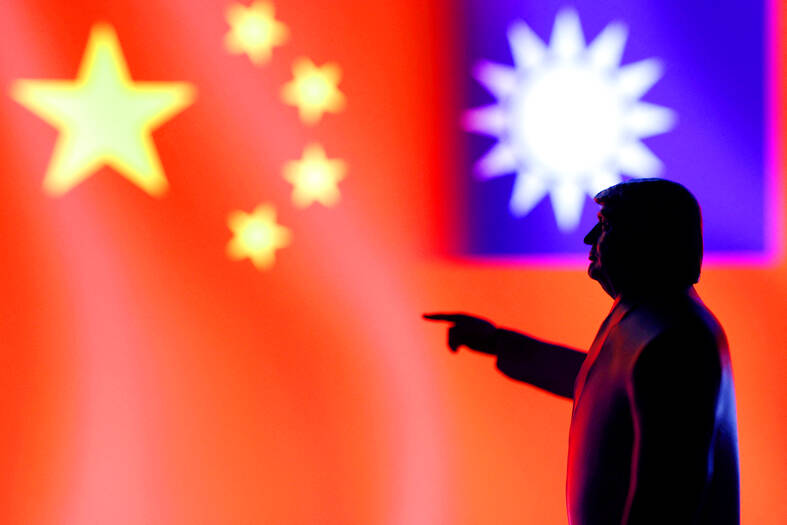US experts on Friday said that US President Donald Trump might adopt a fluid strategy toward cross-strait relations, shifting between stronger support for Taiwan and pursuing a deal with China, adding that the outcome of the recall campaign raises concerns about Taiwan’s national security investments, while Beijing sees the results as a chance to weaken the ruling Democratic Progressive Party (DPP).
Former American Institute in Taiwan chairman Richard Bush and foreign policy analyst Ryan Hass published an article on Friday titled “Taiwan’s recall vote: Implications for Taiwan, China, and the United States” on the Washington think tank Brookings’ Web site.
Bush and Hass first discussed the recall campaign’s outcome, saying: “Taiwan’s government remains divided,” as not a single Chinese Nationalist Party (KMT) legislator was recalled.

Photo: REUTERS
They questioned whether the KMT would be able to capitalize on this momentum and build more public support in upcoming elections.
From Washington’s perspective, if the outcome leads to a prolonged political deadlock that hinders Taiwan’s national security investments, it would “raise concerns ... about Taiwan’s readiness for self-defense,” they said.
Conversely, if the outcome stirs a political contest “to persuade voters of who can best protect peace and preserve the status quo, then it could have a moderating effect on Taiwan’s political discourse” — a development that would be welcomed by Washington, they added.
Beijing “likely feels relieved” at the outcome, as the DPP would “struggle to pass major increases in defense spending or other signature initiatives,” the article said.
Beijing would try to diminish public support for the DPP by discrediting its leaders and “encourage greater support for Taiwan leaders who are supportive of deeper cross-strait engagement,” it said.
However, they said that while “the question of what lessons Beijing will draw from the recall campaign presently is unknowable,” from now to the 2028 elections, China is unlikely to “exert so much pressure that it alienates voters who might otherwise support the KMT,” and would likely adopt a “calibrated, two-handed approach.”
If Beijing does put more pressure on Taiwan, US political leaders would call on Trump to show more support for Taiwan, they said.
“This could include greater rhetorical support for Taiwan, increased arms sales, higher visibility US military presence operations around Taiwan, or more visible high-level interactions between US and Taiwan officials,” they added.
Trump is likely to show more support for Taiwan if he is “focused on protecting his self-image of strength and resolve,” it said.
However, if Trump is looking to make a deal with Chinese President Xi Jinping (習近平), he might use US policy toward Taiwan as a bargaining chip to reach a favorable trade deal with China, they said.
Trump is likely to oscillate between these two approaches, like he has shifted his stance on Ukraine and NATO in recent months.
“Trump views his unpredictability as a strategic asset,” they wrote.

A small number of Taiwanese this year lost their citizenship rights after traveling in China and obtaining a one-time Chinese passport to cross the border into Russia, a source said today. The people signed up through Chinese travel agencies for tours of neighboring Russia with companies claiming they could obtain Russian visas and fast-track border clearance, the source said on condition of anonymity. The travelers were actually issued one-time-use Chinese passports, they said. Taiwanese are prohibited from holding a Chinese passport or household registration. If found to have a Chinese ID, they may lose their resident status under Article 9-1

Taiwanese were praised for their composure after a video filmed by Taiwanese tourists capturing the moment a magnitude 7.5 earthquake struck Japan’s Aomori Prefecture went viral on social media. The video shows a hotel room shaking violently amid Monday’s quake, with objects falling to the ground. Two Taiwanese began filming with their mobile phones, while two others held the sides of a TV to prevent it from falling. When the shaking stopped, the pair calmly took down the TV and laid it flat on a tatami mat, the video shows. The video also captured the group talking about the safety of their companions bathing

A classified Pentagon-produced, multiyear assessment — the Overmatch brief — highlighted unreported Chinese capabilities to destroy US military assets and identified US supply chain choke points, painting a disturbing picture of waning US military might, a New York Times editorial published on Monday said. US Secretary of Defense Pete Hegseth’s comments in November last year that “we lose every time” in Pentagon-conducted war games pitting the US against China further highlighted the uncertainty about the US’ capability to intervene in the event of a Chinese invasion of Taiwan. “It shows the Pentagon’s overreliance on expensive, vulnerable weapons as adversaries field cheap, technologically

Starting on Jan. 1, YouBike riders must have insurance to use the service, and a six-month trial of NT$5 coupons under certain conditions would be implemented to balance bike shortages, a joint statement from transportation departments across Taipei, New Taipei City and Taoyuan announced yesterday. The rental bike system operator said that coupons would be offered to riders to rent bikes from full stations, for riders who take out an electric-assisted bike from a full station, and for riders who return a bike to an empty station. All riders with YouBike accounts are automatically eligible for the program, and each membership account